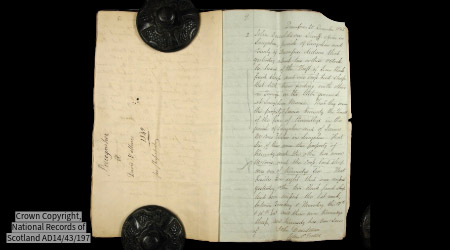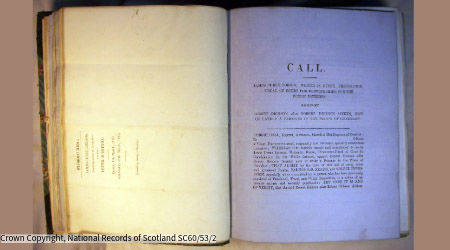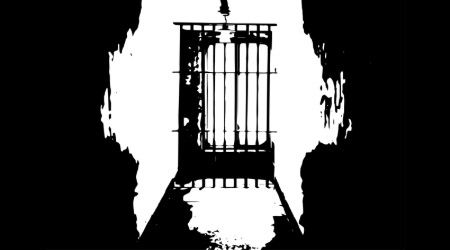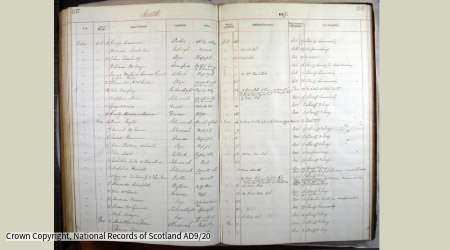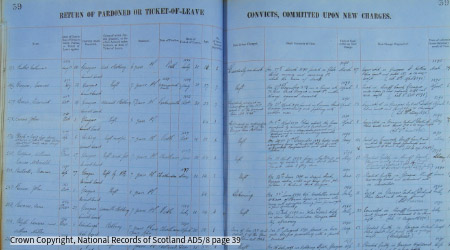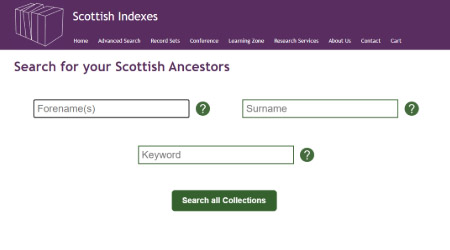What's New on Scottish Indexes
Scottish Prison Records
17 January 2025
We have added 105,855 entries to Scotland's Criminal Database. This new index covers 1871-1878. This means that Duke Street prison records are now indexed from 1845-1878 (males and females), 1884-1885 (males) and 1887-1895 (males). The total number of prison register entries indexed is now 607,487. This brings Scotland's Criminal Database to 919,075 entries. Search for your ancestors here.
Information added to Mental Health Records Index
17 January 2025
We have been adding more ages, addresses and occupations to the Scottish Mental Health Records Index (1858-1921) to make it easier to identify ancestors. This is an ongoing process. If you find an entry that you think is your ancestor always click 'Click here to search for any other records for this patient'. This groups all records for that patient together and hopefully one will have some additional information.
While adding this information we have uncovered the record of Robert Coltart who was committed to the Midlothian and Peebles District Asylum on 30 May 1883. Robert was a famous sweet seller in Galashiels and author of "Coulter's Candy", also known as "Ally Bally" or "Ally Bally Bee".
Scottish Paternity Index Updated
17 January 2025
Extracted decrees from 1924 have been added to the database as they are now over 100 years old. We have also added select paternity cases from Banff and Wick Sheriff Courts. You can see a breakdown of which records are indexed here.
Sheriff Court Criminal Records
7 September 2024
We have added a wide range of Sheriff Court criminal records to Scotland's Criminal Database. These include summary and jury trials and some entries date back to 1759! Counties added include Banffshire, Kirkcudbrightshire, Peeblesshire and Selkirkshire; see a full breakdown of the coverage here.
In many instances witnesses and jurors have also been indexed, in addition to the accused and victims. We hope this will be especially helpful for records of cases prior to 1855 as even a brief entry could help pinpoint a family's movements.
You can search these as part of Scotland's Criminal Database. You will find more information on these and other criminal records in our Learning Zone.
Updates to Scottish Paternity Index
5 August 2024
This update has added paternity cases from Dumfries Sheriff Court Processes from 1835-1846 and from Wick Sheriff Court from 1833-1834; see a breakdown of coverage here.
Learn more about Actions of Affiliation and Aliment in our Learning Zone article: Finding Paternity Cases in Sheriff Court Records.
Updates to Sasines - Scottish Property Records
2 July 2024
Thanks to our amazing volunteers we have just updated our index to Scottish property records. Dive right in and search here.
In Scotland property records are known as sasines. Although there is a computerised index for the records from 1781 to the present day as researchers we often need the earlier records: that is what we are working on.
This update includes entries from the General Register of Sasines (covering all counties of Scotland) and the Particular Register of Sasines for the counties of Stirling, Clackmannan and the Stewartry of Menteith (part of Perthshire).
You can see a detailed breakdown of what is indexed so far here on our coverage page.
Discover more:
The computerised index is available in the National Records of Scotland. If you are looking for a record dated earlier than 1781 and we have not indexed it yet there are finding aids in the Historical Search Room.
Not used sasines before? Check out our Learning Zone article which gives you an overview of these wonderful records.
Updates to Mental Health Records Index
21 March 2024
We have indexed the volumes of the 'General Register of Lunatics in Asylums'. These volumes name the person, tell us which asylum they were committed to and give us the date of death, transfer or release. Sadly these registers do not give an age for each person. Although some individuals could be easily identified through their date of death others are harder to identify.
The corresponding 'Notices of Admissions by the Superintendent of the Mental Institutions' do give ages as well as other identifying information, such as occupation, address, and next of kin. As we have searched these volumes for individual clients we have taken note of the ages, addresses and occupations of other patients and these have been added to our index. There is still a long way to go but we hope these additions will help researchers.
Top Tip
Use the grouping feature to see all entries for each patient. As each individual has a unique ID you can group their records together. On each index entry page, you will see the option Click here to search for any other records for this patient . You may find that we have added an age to one of the entries.
Learn more about this record set in our Learning Zone article: Mental Health Records in Scotland.
Updates to the Scottish Paternity Index
21 March 2024
Aberdeen, Stirling and Forfar cases added; see a breakdown of coverage here.
We offer a service to search Sheriff Court Processes to find the paperwork related to Actions of Affiliation and Aliment . These are really important for genealogical research and can solve the mystery of an unknown father.
When we search the boxes of paperwork for one client, we take note of all Affiliation and Aliment (paternity) cases we come across and add these to our index. Sheriff Court Processes are always interesting and can contain hidden gems such as love letters or photographs.
For Aberdeenshire, the court processes are even more important. Sadly the corresponding volumes of extracted decrees have not survived. Hopefully, this update will solve a few family history mysteries.
Learn more about Actions of Affiliation and Aliment in our Learning Zone article: Finding Paternity Cases in Sheriff Court Records.
Scottish Paternity Index Expanded
4 December 2023
Records from across Scotland have been added to the Scottish Paternity Index; see a breakdown of coverage here.
These are vital cases that can unlock long-kept family secrets. If a woman was unmarried and had a child she could take the father of the child to court to force him to pay maintenance of the child.
This update includes Forfar Sheriff Court cases 1826-1828 (extracted and unextracted) which Emma has been working through for a few months.
Searching these without an index requires working through unindexed boxes of folded paperwork. Although looking for one specific case, Emma has taken note of all paternity cases and these have now been added to our index. Hopefully these will help a few people solve a mystery.
For example; Ann Hogg, daughter of John Hogg, Newtonleys, Kincardineshire took George Clark, mason in Forfar to court. She had a child on 16 February 1827.
Meanwhile, another case shows that Ann Matthew, wife of James Laurence, a weaver at Fraserfield near Arbroath took Peter Dures, Wright in Ground of Almeriecloss, Arbroath to court in 1828. Ann had given birth to her son James on 3 February 1822. Perhaps James Laurence was not very keen on paying for another man s child. The records show that Ann and James had a daughter Barbara in 1826 then a son David in 1827. Perhaps the growing family meant that funds were very tight.
This update includes 1,143 cases from across Scotland. If you have not used these records before you will find help in our Learning Zone.
Search over half a million prison register entries on scottishindexes.com
24 November 2023
Over 180,000 prison register entries added from 10 Scottish prisons:
Dunbar (1844-1878)
Edinburgh Bridewell (1818-1823)
Edinburgh Police Prison (1841-1841)
Linlithgow (1849-1849)
Ayr (1897-1905)
Campbeltown (1840-1895)
Duke Street (1845-1871,1887-1895)
Paisley (1848-1864)
Aberdeen (1905-1911)
Dundee (1922-1927)
This brings the total number of entries in our prison index to over half a million. Of course, this is only part of Scotland's Criminal Database. In total you can search over 800,000 criminal records on our website.
The Court of Session
9 September 2023
Within the Court of Session records are a variety of what we could call civil court cases. For example, we find people being pursued for unpaid debts. We also find divorce cases and other matters relating to marriage and separation, as well as cases relating to the guardianship of children.
These can be very useful for family historians. Not only can they give us genealogical information which we may not be able to find anywhere else but they can also tell us a story. Our index contains over 600,000 entries and is free to search.
If you find an entry relating to your research you have the option to use our service or you can view the original in the National Records of Scotland. Not used Court of Session records before and want to find out more? Visit our Learning Zone.
Crown Office Opinions
9 September 2023
Emma was very excited to release an index to the Crown Office Opinions!
This is a fascinating insight into early 19th-century cases that did not go to trial. The Crown Office Procedure Books index covers all cases referred to the Crown Office for an opinion. This includes all High Court and all Sheriff Court jury trial cases as well as others that went to court.What about the cases that did not go to trial?
Here we have the case of Elizabeth Trainer or Cook in 1825. Note that there were "No proceedings". What did Elizabeth do? Why was the case not taken to court? Can we find out more about Elizabeth? If this is your ancestor I am sure you would want to know more!
Catalogued just as 'Opinions' and referenced AD13 by the National Records of Scotland, Emma has uncovered a hidden treasure trove of information. So far it appears that all cases that were returned as No proceedings between 1825 and 1833 have paperwork in the AD13 files. Emma will continue her research into the post-1833 records to assess what survives.
What then about Elizabeth Trainer or Cook, what's her story?
The Crown Office Procedure Book (AD9/1 p. 17) tells us that the Crown Office received her case on 20 January 1825. Her crime? Assault. The Jurisdiction is given as Edinburgh. On the 25th of January 1825 her case was returned with the opinion "No Proceedings". Although interesting, it doesn't tell us a great deal.
AD13/35 are Edinburgh Opinions for January 1825. Within this record we discover a lot more. We read in the petition:
"That on Wednesday last the 5th of January Current when Hugh Johnston, Pensioner at present in Edinburgh was in the house of John Cook, Packman Residing in Walkers Close, Grass Market of Edinburgh, Elizabeth Trainer or Cook wife of the said John Cook, did wickedly and maliciously assault and attack the said Hugh Johnston and strike him violently on the head with a bottle, whereby he is severely cut and wounded to the effusion of his blood and danger of his life and if he dies she will be guilty of the crime of murder; in these circumstances the present application is made to your Lordship to the effect aftermentioned".
On 10 January 1828 a doctor provided a medical certificate and stated that "Hugh Johnston Petitioner lies Dangerously ill in consequence of two severe Wounds on his Head - he is fit to be examined, Altho I am of the Opinion he is somewhat Intoxicated". Given the gravity of the situation, why were there "No proceedings"?
We read, "This is a most unintelligible case - The woman accused seems clearly to have been innocent & the injur'd person".
The Crown Office opinions certainly give us a lot more insight into these cases.
Search these as part of Scotland's Criminal Database. If you find a case you can use our service or visit the National Record of Scotland and view the original records for yourself.


